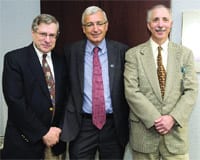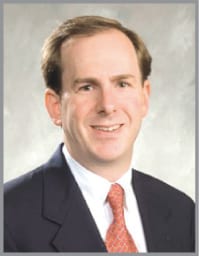Director General of Hadassah University Medical Center Visits Baystate
SPRINGFIELD — When Dr. Shlomo Mor-Yosef, director general of Hadassah University Medical Center in Jerusalem, visited Baystate Medical Center recently, he was surprised to learn something about the hospital’s state of emergency response.
“I didn’t expect to see such a high level of preparedness at a hospital that isn’t in a conflict zone,” said Mor-Yosef, comparing Springfield to Israel, where disaster management and terror medicine are a daily way of life.
While at Baystate, Mor-Yosef met with physicians and administrators to jointly discuss dealing with mass casualties, emergency medicine, Baystate’s nearly $50 million investment over the past five years in electronic medical records (EMR) and clinical information systems, and other health care topics.
“It is part of everyday scientific activity to collaborate, to share knowledge, and to learn from the experiences of others,” said Mor-Yosef, who also holds the title of professor at the academic medical center he oversees.
As part of his visit, Mor-Yosef met with hospital officials to learn more about Baystate’s vision for the ‘Hospital of the Future’ scheduled to open in 2012, which will feature a heart and vascular center and new patient-care units with private rooms. Back home in Jerusalem, Mor-Yosef is overseeing construction of the Sarah Wetsman Davidson Tower, a 19-story inpatient facility designed not unlike Baystate’s “to address today’s needs, tomorrow’s breakthroughs, and evolution in patient care for years to come.”
Mor-Yosef noted one telling difference between Baystate Medical Center and the Sarah Wetsman Davidson Tower in Jerusalem: “we are building our operating rooms underground for protection.”
Mor-Yosef was in the U.S. to attend the 88th annual national convention of Hadassah, the country’s largest Zionist organization, which was held in late July in Florida. His visit to Baystate was arranged by Dr. Gordon Josephson, chief operating officer of Baystate Medical Practices.
For more than 90 years, Hadassah has opened its hospital doors to all without regard for race, religion, or ethnic origin. People from all the countries in their region turn to Hadassah for medical care and are treated alongside patients from the Mediterranean Basin, Europe, South America, and the U.S. Often treating terrorists alongside their victims, the world-renowned Jerusalem hospital was nominated for the 2005 Nobel Peace Prize for promoting peace in the Middle East region by providing equal treatment to Palestinians and Israelis.
“It’s a way of life for us — difficult and emotional sometimes, but we must remain professional and treat everyone. In essence, we are a bridge to peace,” said Mor-Yosef.
Board-certified in obstetrics and gynecology, Mor-Yosef, who also holds a master’s degree in Public Administration from the Kennedy School of Government at Harvard University, gave up medical practice when he was asked to join the administration at the Hadassah Medical Organization (HMO).
“It was not my dream. My dream was to be a physician. But when I was asked to join the administration, I felt the impact and difference I could make would be something global, not just patient to patient,” he said.
The Hadassah Medical Organization in Israel is home to 850 physicians, 1,940 nurses, and 1,020 paramedical and support staff who work at two medical centers in Israel, with more than 1,000 beds, 31 operating rooms, and 9 specially oriented intensive care units.
Hadassah, the Women’s Zionist Organization of America, is the largest women’s and the largest Jewish volunteer organization in the U.S., and supports the Hadassah Medical Organization in Israel. HMO is the largest medical and research center in the Middle East, treating more than 600,000 patients from all over the world each year at its two hospitals, a community health center, and 90 outpatient clinics.




Comments are closed.